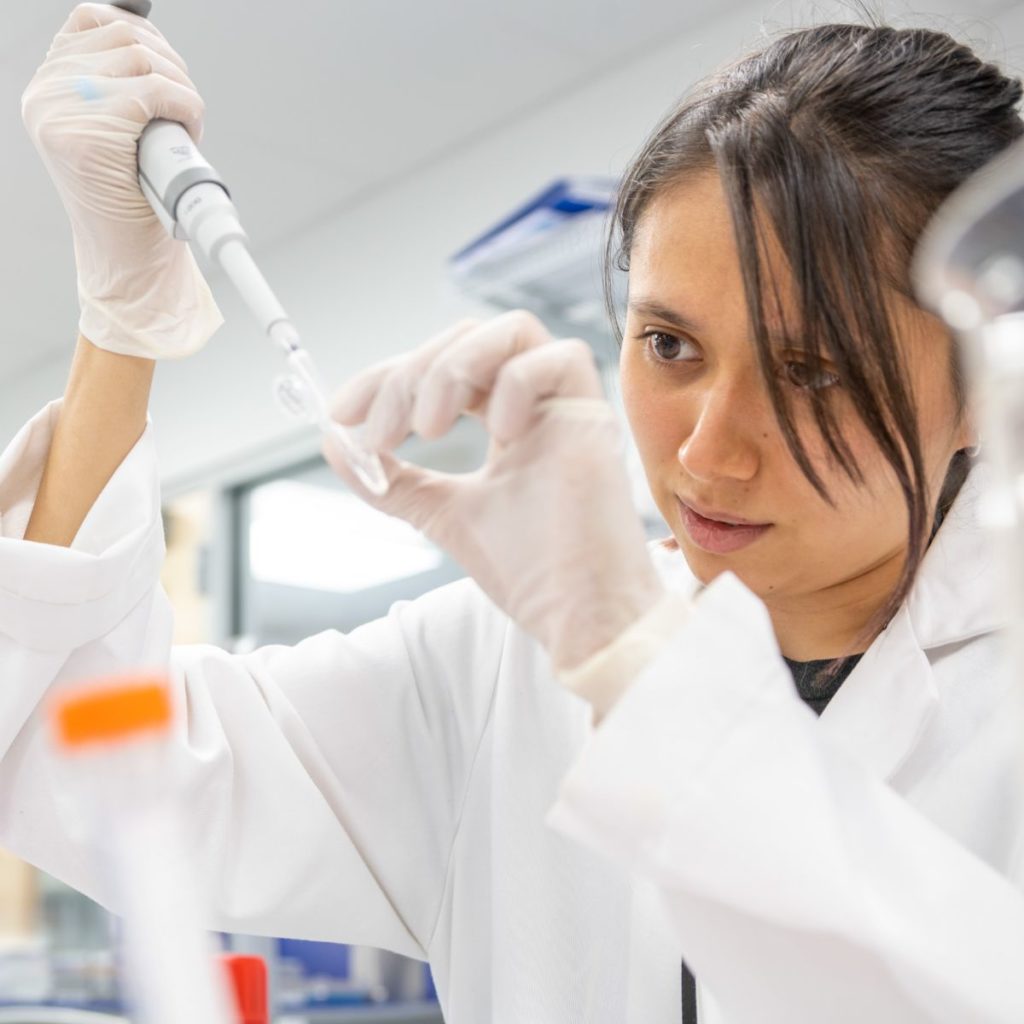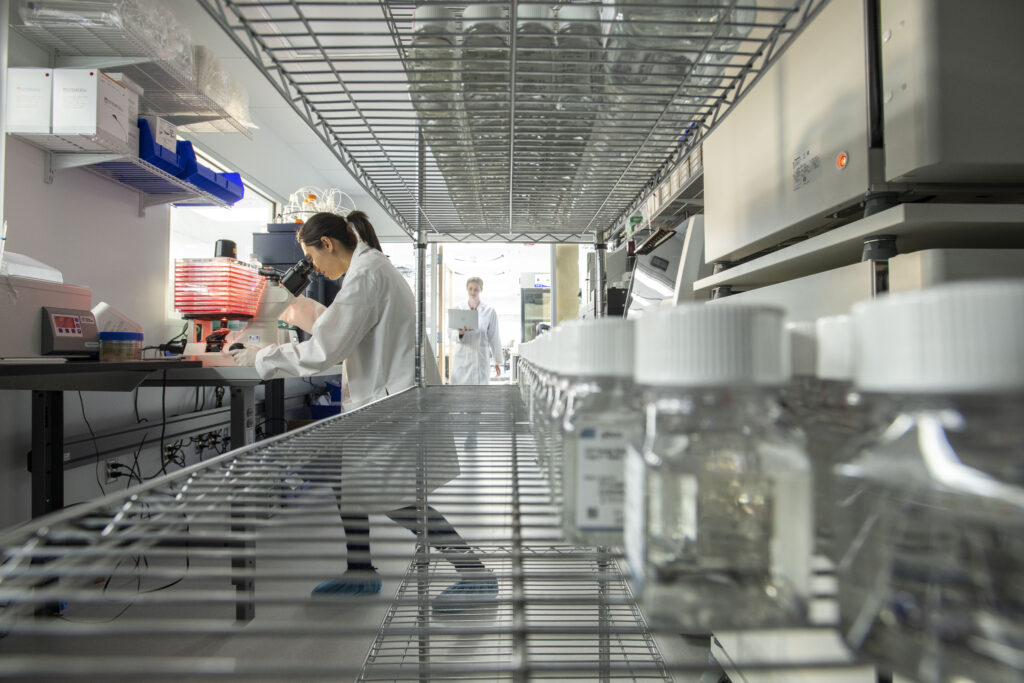
Finding Passion and Purpose in Her Work
When Jasmine Harris graduated with a bachelor’s degree in Materials Science and Engineering from MIT and began her job search, she hadn’t taken a biology course since her freshman year. She was seeking a research position that would give her independence, responsibility, and allow her to learn a new scientific discipline. And, while Jasmine had worked for two years in a biological conservation lab in high school, she was determined not to pursue a career in biology. “I’m also very stubborn,” she said. “I never wanted to fit into expectations based on my gender identity. I felt the need to defy expectations and show I could do anything my male peers could do. So, biology was out because that’s the science I was told to go into,” she stated.
After starting in chemistry at MIT, she discovered MIT’s undergraduate program in Materials Science and Engineering, seeing it as an opportunity to learn many different aspects of science and engineering. “That worked for me because, while I love to learn different things, I’m very non-committal. I just realized I’m sort of like stem cells in that I’m very non-committal. I want to be everything,” she said.
Most biotechnology companies require candidate researchers to have a bachelor’s or master’s degree in biology or a related field or to have experience in biological research. But Jasmine was offered, and accepted, an Associate Scientist position with Novellus Therapeutics, a company created by Factor Bioscience to develop therapeutic products based on Factor’s mRNA, gene-editing, and cell-reprogramming technologies. “I ended up choosing this company over other companies because it granted me the most agency—and it also gave me the most opportunity to learn something new,” she said. “I guess someone might call it a risky decision,” she said. “But I saw the potential in the technology, and I was very curious to learn a new field. I knew it was a unique opportunity.”
Beginning a Career in Science
In entering a new scientific field, Jasmine faced many challenges. But her new employers, Dr. Matt Angel and Dr. Christopher Rohde, worked closely with her, mentoring her through the ups and downs of her early days. “When I joined the company, the first project that I led dealt with uncoded regions of mRNA,” said Jasmine. “At the same time, I started to learn how to reprogram cells from Matt, turning fibroblasts into stem cells. And I was doing those two things simultaneously to figure out if I wanted to be on the molecular biology side or the cell biology side,” she explained. “I was learning a new field on the fly while I also was expected to produce viable research for the company.”

An Opportunity Arises to Address a Global Challenge
Jasmine found that she liked cell biology and wanted to focus on cell work. So, after a meeting with Dr. Angel, they decided to differentiate the in-house produced pluripotent stem cells into mesenchymal stem cells (MSCs). “For two years, I was sort of off in a corner, differentiating these cells, testing out and characterizing them, and writing up procedures for animal studies. And then COVID happened, and suddenly there was high interest in anti-inflammatory therapies.”
In 2020, only two years after she had started work, Jasmine’s research fundamentally transformed her company. Jasmine presented the results of her work on generating MSCs using advanced mRNA cell reprogramming technology at the American Society of Gene & Cell Therapy 2020 Annual Meeting. Later that year, her work resulted in a multimillion-dollar contract with a public pharmaceutical company to develop an MSC-based treatment for acute respiratory distress syndrome (ARDS), including in COVID-19 patients, and Novellus shifted to focus entirely on developing MSC-based therapies. In April 2021, Novellus secured a second multimillion-dollar contract with another public company, and in July 2021, Novellus was acquired by that company for $125 million.
“Jasmine is one of those rare individuals with both the capacity to perform challenging scientific research and the drive to push through the challenges and achieve success. It is difficult to convey the magnitude of the impact that Jasmine has had on our company, our industry, and the field of regenerative medicine in only three short years. I am incredibly grateful for having had the opportunity to work with Jasmine,” said Dr. Angel, CEO and Co-Founder of Factor Bioscience and Co-Founder of Novellus Therapeutics.
“I have found a field of study I’m passionate about,” said Jasmine. “That’s a huge takeaway for me. I started as someone who had minimal direction regarding where I wanted to go for my research, and now I feel very directed and focused. I know that I want to do regenerative medicine. I know I want to work with stem cells. I know the cellular lineage that I want to go into. This is a huge takeaway for me,” said Jasmine. Jasmine recommends anyone going from undergrad to grad school take a couple of years to work in industry. “I feel more equipped for grad school. I’ve had to deal with high-pressure timelines that go with multimillion-dollar research projects.” When asked what she would advise a job seeker in biotech today, she paused. “Don’t settle for something because it’s what you initially got into or thought you wanted. If I had pursued a career in materials science, I would have been miserable,” she stated emphatically.
“At the end of the day, if you’re unhappy, it’s not going to be worth it because you’re not going to be able to do as much research that will have an impact as you would if you were passionate about your work.” And Jasmine’s passion and hard work have paid off. She has been accepted into the Developmental & Stem Cell Biology Graduate Program at the University of California San Francisco, one of the top graduate programs globally for stem cell research, and leaves Factor Bioscience to start her Ph.D. program in the fall.